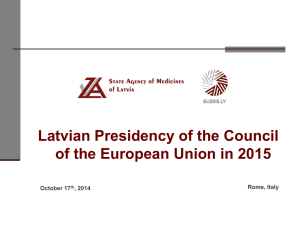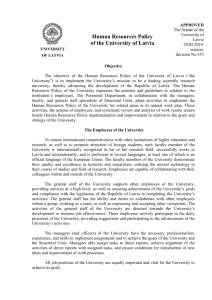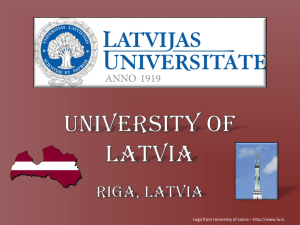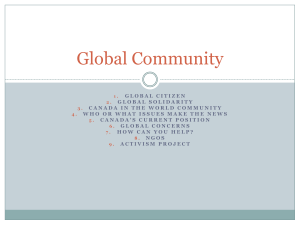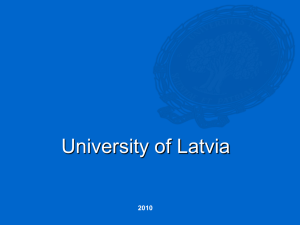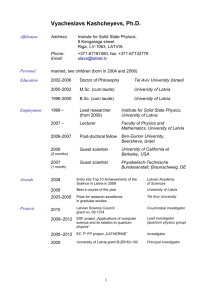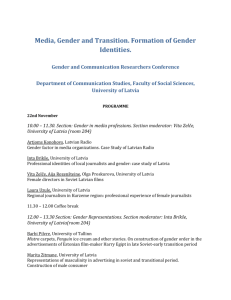Mission Report_Riga_2014
advertisement
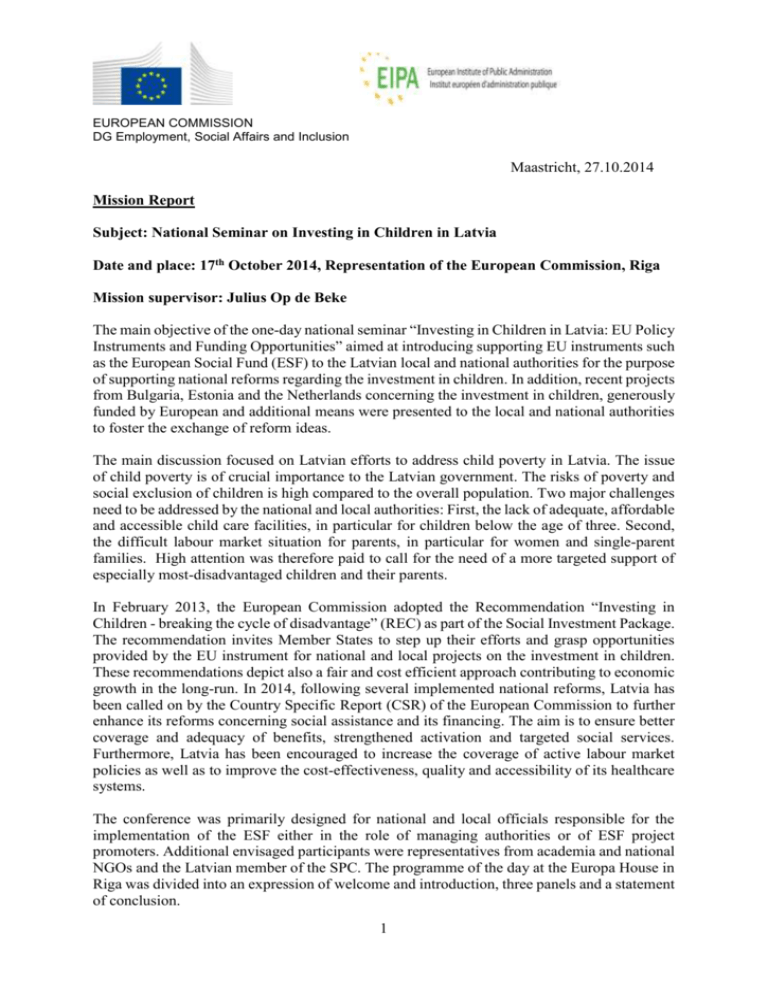
EUROPEAN COMMISSION DG Employment, Social Affairs and Inclusion Maastricht, 27.10.2014 Mission Report Subject: National Seminar on Investing in Children in Latvia Date and place: 17th October 2014, Representation of the European Commission, Riga Mission supervisor: Julius Op de Beke The main objective of the one-day national seminar “Investing in Children in Latvia: EU Policy Instruments and Funding Opportunities” aimed at introducing supporting EU instruments such as the European Social Fund (ESF) to the Latvian local and national authorities for the purpose of supporting national reforms regarding the investment in children. In addition, recent projects from Bulgaria, Estonia and the Netherlands concerning the investment in children, generously funded by European and additional means were presented to the local and national authorities to foster the exchange of reform ideas. The main discussion focused on Latvian efforts to address child poverty in Latvia. The issue of child poverty is of crucial importance to the Latvian government. The risks of poverty and social exclusion of children is high compared to the overall population. Two major challenges need to be addressed by the national and local authorities: First, the lack of adequate, affordable and accessible child care facilities, in particular for children below the age of three. Second, the difficult labour market situation for parents, in particular for women and single-parent families. High attention was therefore paid to call for the need of a more targeted support of especially most-disadvantaged children and their parents. In February 2013, the European Commission adopted the Recommendation “Investing in Children - breaking the cycle of disadvantage” (REC) as part of the Social Investment Package. The recommendation invites Member States to step up their efforts and grasp opportunities provided by the EU instrument for national and local projects on the investment in children. These recommendations depict also a fair and cost efficient approach contributing to economic growth in the long-run. In 2014, following several implemented national reforms, Latvia has been called on by the Country Specific Report (CSR) of the European Commission to further enhance its reforms concerning social assistance and its financing. The aim is to ensure better coverage and adequacy of benefits, strengthened activation and targeted social services. Furthermore, Latvia has been encouraged to increase the coverage of active labour market policies as well as to improve the cost-effectiveness, quality and accessibility of its healthcare systems. The conference was primarily designed for national and local officials responsible for the implementation of the ESF either in the role of managing authorities or of ESF project promoters. Additional envisaged participants were representatives from academia and national NGOs and the Latvian member of the SPC. The programme of the day at the Europa House in Riga was divided into an expression of welcome and introduction, three panels and a statement of conclusion. 1 EUROPEAN COMMISSION DG Employment, Social Affairs and Inclusion LIVIJA LIEPINA opened the seminar by welcoming all participants in the seminar to discuss the situation of children living under and being endangered by poverty in Latvia. She emphasized that the key focus of the seminar lies in particular on the cooperation between different actors to provide effective policies and reforms that reduce child poverty. The main objective of the local governments should be to try to decrease taking children out of their families. She pointed out that the government is supposed to have enough sources to keep the children in their families through supporting these families. She stressed that Latvia has already undertaken several efforts to provide needed reforms. The role of NGOs has been of crucial and ever growing importance in this process. She pointed out the important role of local governments and encouraged local authorities to cooperate with local NGOs. This way society can keep and benefit from expertise in the reform and implementation process. She also underlined the future involvement of the ministries of health and education in this crossinstitutional cooperation that can help to decrease the problems of families at risk. ANSIS BOGUSTOVS, the moderator of the seminar, summarized that to reach the main aim of strengthening families more focus needs to be paid to their support. He pointed out that according to the European Commission’s CSR Latvian efforts to address this problem were assessed as not yet sufficient. He asked how the Latvian authorities respond to this assessment after the reforms they have launched. LĪVIJA LIEPINA responded to this comment by emphasizing that the seminar’s aim is not to criticise too much. She stressed it is important to understand what the situation of Latvia is like and to further continue the reform process. Latvia has been very active since 2004 and she thanked particularly NGOs in this process. She emphasised that NGOs have been strong actors and active partners to local governments in creating and fostering ideas about inter-institutional cooperation and about investments in institutions. JULIUS OP DE BEKE welcomed the opportunity to hold a national seminar in which local authorities, NGOs, experts of the field and the European Commission would come together to discuss how to invest in families and children. He responded to the moderator’s comment by putting forward numerical insights concerning the Latvian situation of child poverty and families at risk. The figures indicated that the risks of child poverty are still high for low income families, particularly for single-parent families. Especially, mothers have great difficulties to find a job on the labour market that maintains the family. He emphasised that the Social Investment Package provides opportunities to foster the future development of people’s skills and capacities. These measures include supporting families to participate fully in employment and social life. He appreciated the opportunity to share experiences about financial instruments for purposes that are relevant to Latvia such as supporting children and their parents. The focus lies particularly on woman and on children under the age of three. He was delighted to explain on behalf of the European Commission how and why money from European Commission Funds can come to Latvia to foster relevant projects in the framework of local and national reforms to invest in children. He emphasised that the main objective of the seminar is to enhance the prevention of poverty and risks to poverty. He stressed that prevention is always better than the cure. He concluded that soft investment should be expanded in order to achieve this aim. 2 EUROPEAN COMMISSION DG Employment, Social Affairs and Inclusion JELENA ĀBOLA welcomed the participants on behalf of the Latvian representation of the Commission. She thanked the attendees for taking the initiative to discuss the subject of child poverty and investment in children in this national and inter-institutional environment. Ansis Bogustovs opened the first panel concentrating on key challenges and policy reforms. He handed over the ground to JULIUS OP DE BEKE asking him to explain why there is a growing need for soft investment. With his presentation Mr. Op de Beke put the spotlight on the EU’s 2014 Recommendation for Latvia and the Investing in Children to break the cycle of disadvantage. He outlined the EU’s approach to investing in children and current trends in child poverty in Latvia. He pointed out that there seems to be an efficiency problem in Latvia: although money is spent on investing in children the results in terms of poverty reduction are not very impressive. Furthermore, there are many households with a low work intensity due to the conditions of the labour market aggravating the high rate of risk of poverty. Both are affecting particularly children below the age of three and one single parent families, who are often consisting of single woman with a child. He discussed the Commission’s recommendation to Latvia. He encouraged Latvia to focus on further efforts to counter particularly relative poverty that constitutes a big problem in the country. He recommended to prevent institutionalization, to target disadvantaged children, to reform the tax system and benefits, as well as housing allowances. He explained why it pays off to invest in children and to better prevent than to cure damages. Finally, he introduced European policy instruments and funding opportunities that allow Latvian local authorities to benefit for their reform projects. He presented two best practice examples as source of inspiration for future projects. TAŅA LĀCE assessed the key challenges in fighting child poverty in Latvia. She stressed that emphasis should be put on families in order to create good conditions for children to be able to stay in their families. She pointed out that numerous positive measures have been implemented by the Latvian state. Yet several problems still remain. One of the major issues to be addressed remains that employment does not solve the problems of the families, since real income is low due to high tax burdens. Mrs. Lāce emphasized that payment should create incentives to work and opportunities to maintain the family. Equally, social benefits should reach families at risk to poverty and not the well doing parts of society. She recommended that more funding is invested into the education system as higher education reduced the risks of poverty. In addition, the tax benefit system, the health care system and housing opportunities should become subject to investigation by national authorities. These systems can provide better conditions for children and their families in the future. In the end, she stressed the vital role of NGOs to ensure information about and efficient work with financial instruments. The last contribution of the first panel focused on policy responses and reforms in Latvia. MAKSIMS IVANOVS presented the political intervention various ministries have undertaken to counter child poverty and to invest in children in Latvia. He stressed the horizontal priority of these ministries to reach the following objectives: Implementing family policies, a 20072014 action plan, meeting the Barcelona targets, prolonging the social inclusion policies beyond 2014 and establishing tool for systematic assessment for effectiveness. He pointed out that a correlation exists between the lacking support of woman to counter their unemployment and child poverty. Therefore, the main objective of these policies is to improve the coverage 3 EUROPEAN COMMISSION DG Employment, Social Affairs and Inclusion and diversification of the childcare system to raise the opportunities for employment of mothers. Attention will be paid to expand social policy and particularly the availability of services. The investigation of structural and environmental indicators suggests that one must raise the monetary benefits of employment to promote birth rates. It is also essential to meet the needs of the group at the highest risk of poverty. These are children in one-parent families. He concluded his presentation by stressing that the conditions to receive support should be reviewed annually. This procedure will encourage the development of alternatives to financial means. These alternatives will result in reduced risks, better family policy guidelines, housing programmes, better taxation schemes and targeting as well as de-institutionalization. ANSIS BOGUSTOVS thanked the speakers for outlining the current state of the situation in Latvia. He emphasized the importance to define the term single-parent family to better target children and parents who are in need of support. He concluded that definitions of single parent family can vary in terms of their meaning such as: First, single-parent mother and child family, which is most often the case. Second, there exists father and child families, which are supported by less services. Third, co-parenting depicts a growing habit, which means switching care between two-households and differs from the previous constellations. He pointed out that all of the different constellations need to be taken into account and that services should be adapted and implemented for each scenario. The second panel introduced novelties and opportunities for investing in children through EU funding instruments. With the first presentation BAIBA STANKĒVIČA provided an overview of available financial instruments for investing in children. First, she outlined that the government aims at leaving the discretion of implementing projects to the local governments. In addition, de-institutionalization constitutes one of the main objectives of the new policies. The main target group to be invested in are children below the age of three. The aim is to decrease their institutionalization and to keep them in their family surroundings. Funding from the European Social Fund and the European Regional Fund will be split according to regions and their number of clients among three target groups. She emphasized that local governments are the experts about their regions. They are responsible to ensure a logical transition period for de-institutionalization. In addition, she stressed that institutions should be close to the families. Therefore, additional trainings are needed for the services, but also for the families. She concluded by calling for the development of future programs to provide for possibilities such as family holidays and children right protection against violence. Staying in the realm of funding opportunities EDGARS ŠADRIS presented the plans for future distribution of the European Structural and Investment Funds 2014-2020 in Latvia. At first, he gave an outline about the distribution of the ESIF before 2014. In this framework a huge amount has been invested to partnerships programs, transport and entrepreneurship following the national development plan of 2013. The main objective of the plan was to raise wealth through employment by creating new companies and increasing the economy. In addition, he stressed that the new plan for 2015, which is still under investigation, will decrease the investment in transport. Instead, it will increase investment in education and social inclusion and present a strategy to achieve these objectives. In addition, there are plans to create efficiency assessment tools that ensure the proper working and the monitoring of funds. 4 EUROPEAN COMMISSION DG Employment, Social Affairs and Inclusion ZANE LASMANE explained the food package projects to local municipalities in the framework of the Fund For Aid to the Most Deprived. Mrs. Lasmane outlined that European funds will be used for most deprived people in the form of food packages, hygienic goods, housing material and teaching aids. These means aim at reducing the risks of child poverty and the worst cases of poverty. The status of “most deprived person” will be granted to individuals in extraordinary circumstances and persons in critical situations. In order to ensure that funding reaches the people a tender will be opened for the procurement of food and material. The tender provides local authorities the opportunity to apply for financial means for the realization of this project. In addition, she stressed that partner organizations such as local NGOs will distribute the material to the people. NGOs have already gained experience in distributing services to local municipalities. She recommended partner organizations and local governments to merge their cooperation in order to build the capacities to store and distribute goods and materials. She concluded by pointing out that the action program and draft legislation for the package food project have been submitted to the cabinet. Support to the most deprived will be provided from 2015 onwards. The last presentation of this panel focused on the implementation of the SIF in partnership with NGOs. DAIGA EDUKA stressed that within the process of social rehabilitation the possible partnerships with NGOs are at an initial stage, but not the overall solution. She stressed that both institutions fulfil different roles in the process: While local governments define the needs of the municipalities, draw on funds and are locally involved; NGOs provide services with an added value such as the distribution of goods, information about funding possibilities and the stimulus for evaluation and service quality. She stressed that very good experiences have been made with mixed teams of staff from NGOs and local municipalities in projects such as the EEZ project and SOS villages. They were able to provide an effective and inter-disciplinary work by in-house and external experts. On the other hand, she emphasized the continuation of many projects executed by NGOs to depend to a great extent on the continuation of funding. She concluded by saying that NGOs have proven to be reliable partners. NGOs can provide skills and expertise, they work according to the good governance principle and are flexible. Governments should trust NGOs to work with their funds and encourage the cooperation between the two institutions. An assessment has shown that in 30% of the cases where an interinstitutional approach to projects was used the situation of poverty improved. At the end of the second panel Ansis Bogustovs encouraged the participants to ask remaining questions about the cooperation between NGOs and governments, and the use of financial means. It was concluded from the discussion that NGOs have strong means to address the needs of funded projects, but they will always work in close cooperation with the local governments. This way local authorities are able to save resources and keep the responsibility. In addition, NGOs can ensure that support, information and services are provided at place. Partner organizations will have to be certified and apply for one service only. Still, they may cooperate with other municipalities. The third panel moved the discussion to best practice examples such as the Bulgarian SOS Children Villages Association and two examples from the European Platform for Investing in Children (EPIC) database. RADOSTINA PANEVA focused on the Bulgarian project about the prevention of families of risks, to share the Bulgarian experience of cooperation between 5 EUROPEAN COMMISSION DG Employment, Social Affairs and Inclusion municipalities and NGO in these projects. Bulgaria was able to successfully reduce the number of taking children out of their families and to increase de-institutionalization. The municipalities enhanced support such as day-care services. In addition, municipalities ensured gatekeeping by providing alternatives and created new services through outsourcing services to private entities and NGOs. She explained the Bulgarian experience and strategy for the planning, funding, evaluation and contracting phase of the projects. She encouraged the cooperation with certified NGOs that act as monitoring bodies, implementers of projects and services providers conveying additional funds. She stressed the importance to take into account parallel systems at double-cost for closing down old institutions in the de-institutionalization process. These parallel systems and costs result from a transition period that is necessary to ensure the continuing support of families. Further, she recommended to use money of the old institution to invest in the development of alternative support. She concluded by pointing out that the municipalities should take over the coordination and financing of the service after the initiation by the NGOs to ensure the service in the long-run. NGOs will provide good monitoring systems for spending money, which are essential tools to ensure efficiency and quality. The first presentation about a project from the EPIC data base was held by CARINE KIELSTRA who introduced the Triple P - Positive Parenting Programme - parent support. The main objective of Triple P is to invest in parents. Parents are the most important persons to influence the personality of children in their life. If children miss the influence of their parents before the age of 4, they will never be able to catch up at a later point in time. As a consequence, it is important to support the parents of most deprived children to reduce their stress. This will prevent future emotional, social and behavioural cost of children and parents. She outlined that the program embraces all parents and offers different levels of intensity of support. As a consequence, parents are not publicly stigmatized as worst cases. Parents may stay in their surrounding and decide on their own what kind of support they would like to receive. Five core principles are taught to promote a good relationship between parents and their children. To reach a vast amount of parents and to implement Triple P efficiently, recurring funding is necessary to ensure a long-run provision of the service by the program. ANNIKI LAI presented an alternative parent support programme listed in EPIC called ‘Incredible Years’ to be implemented in Estonia. The programme will be launched in the framework of the strategy 2012-2020 for Children and Families. ‘Incredible Years’ aims at improving the well-being of children & families and to promote positive parenting. In the past Estonian family policy focused less on prevention but rather on curing efforts. One of the main objectives of the new policies is to change this approach in the future. A start was made by the New Child Protection Act. The Act put the emphasis on prevention and fostered cross-sectorial cooperation with positive prevention outcomes. Yet, it lacked efficiency. Consequently, three ministries started to cooperate to create a new system of prevention and to increase the capacities of systematic implementation and monitoring. After thorough analysis, the Estonian ministries decided to start a pilot project following the ‘Incredible Years’ programme. The programme addresses all parents who want to participate as well as risk families. The programme implies three levels with an obligation to pass all. It will also be open to Russian speaking parents of the country. The programme will be implemented in cooperation between 6 EUROPEAN COMMISSION DG Employment, Social Affairs and Inclusion local authorities and NGOs. In case of the positive assessment of the pilot, the number of parent groups is to be greatly expanded. At the end of the last panel Ansis Bogustovs gave the participants the opportunity to ask the three presenters practical questions about the planning, implementation and contracting process of the projects. He then handed over to JULIUS OP DE BKE for the closing words of the seminar. Mr. Op de Beke thanked the participants for the national insight and input they gave during the discussion about the current situation of Investing in Children in Latvia. He stressed the need to develop early warning systems against child abuse and welcomed the initiative to start a project in this area. He pointed out again that prevention is always better than the cure. He emphasized that launching the projects seems to be costly, but that these costs are manageable as the target group, which is the number of children affected, is rather small. He encouraged the Latvian state to benefit from the experience of other Member States for developing their own reform projects. He pointed towards the need to undertake additional structural reforms such as reforming the taxation system. This reform is crucial to ensure that family support measures reach the ones that are the most in need. In addition, he called on the (local) authorities to admit to the monitoring committees also representatives of the NGOs and not to hesitate to ask for financial support of their projects. He pointed out that there is enough money for funding purposes of projects to invest in children and parents available. Mr Op de Beke hopes to see many applications of these kinds of projects from Latvia to the open calls of the ESF. The challenge will be to have enough admissible projects to absorb all the available funding. Anna Stawinski 7 EUROPEAN COMMISSION DG Employment, Social Affairs and Inclusion Conference Overview: Welcome and Introduction Moderator/chair: Ansis BOGUSTOVS (Journalist in EU affairs). Līvija LIEPIŅA, Director of Children and Family Policy, Department Ministry of Welfare of the Republic of Latvia. Julius OP DE BEKE, European Commission DG Employment, Social Affairs and Inclusion. Jeļena ĀBOLA, Head of the Communication Unit of the Permanent Representation of the European Commission in Latvia. Panel 1: Setting the Scene: Key Challenges and Policy Reforms Julius OP DE BEKE (European Commission DG Employment Social affairs and Inclusion), The EU’s 2014 Recommendations for Latvia, and the EC Recommendation on Investing in children: breaking the cycle of disadvantage, the EU’s approach and policy instruments. Taņa LĀCE (Riga Stradins University/ Latvian Member of the European Network of Independent Experts on Social Inclusion), Assessment of the key challenges. Maksims IVANOVS (Latvian Ministry of Welfare), Policy response and recent policy reforms in Latvia. Discussant: Ansis BOGUSTOVS Panel 2: Novelties and Opportunities for Investing in Children through EU Funding Instruments Baiba STANKĒVIČA (Ministry of Welfare), Overview of available financial instruments. Edgars ŠADRIS (Ministry of Finance/ Director of EU Funds Strategy Department), Structural and Investment Funds 2014-2020 in Latvia: state of play. Zane LASMANE (FEAD of the Ministry of Welfare), Fund For Aid to the Most Deprived. Daiga EIDUKA (Latvian NGO representing the EU Alliance on Investing in Children), Implementing the SIFs in partnership with NGOs. Discussant: Ansis BOGUSTOVS Panel 3: Best Practice: Bulgarian SOS Children's Villages Association 8 EUROPEAN COMMISSION DG Employment, Social Affairs and Inclusion Radostina PANEVA (SOS Children`s Villages International office CEE/CIS), Examples from Bulgaria: what we can learn from DI and how to develop preventive services in cooperation with municipalities. Discussant: Ansis BOGUSTOVS Panel 4: Presentation of two more good practices from the EPIC database How institutionalization is best prevented through better parenting support Carine KIELSTRA (Head Triple P Netherlands), Triple P – parent support. Anniki LAI (Director of the Department of Children and Families, Estonian Ministry of Social Affairs), Incredible Years – parent support programme, the experience in Estonia. Discussant: Ansis BOGUSTOVS Conclusion: Julius OP DE BEEK 9

